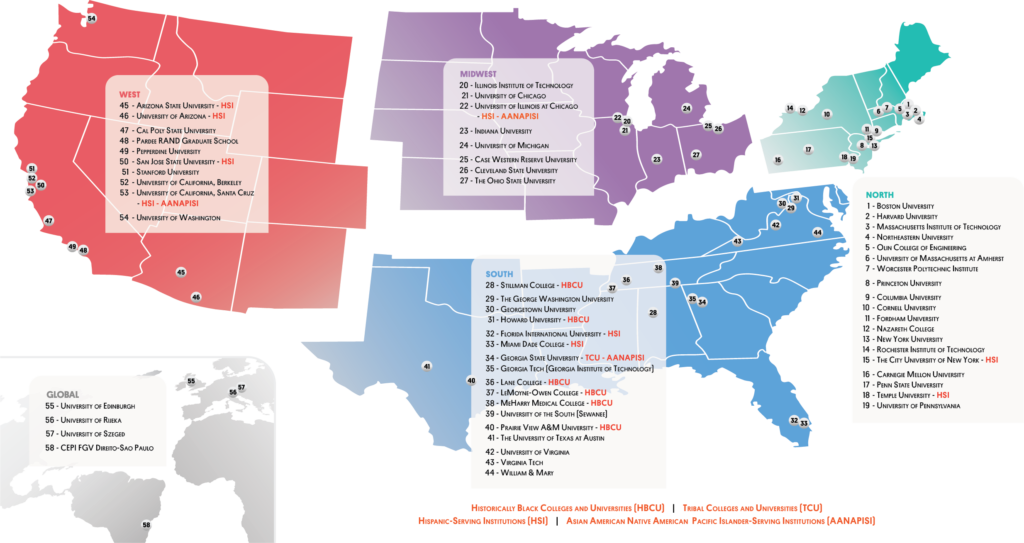The Public Interest Technology University Network (PIT-UN) recently grew the Network to 48 members with the addition of five members: the Illinois Institute of Technology, LeMoyne-Owen College, Northeastern University, Stillman College, and the University of Massachusetts at Amherst. Each institution joins the Network with a strong on campus public interest technology framework and demonstrated commitment to developing and diversifying the field.
- Participation in a learning community of scholars and practitioners seeking to prepare civic-minded technologists and leaders.
- Ability to apply for grant funding offered to Network members.
- Complimentary registration and attendance by Network liaison at the Annual Convening to discuss shared challenges and goals.
- Exclusive access to tool kits, training, and resources that are available for members only.
- Access to workshops and seminars that showcase the latest advancements in public interest technology.

New Members
Illinois Institute of Technology, Chicago
Illinois Tech, a small private college, was founded in 1890 to serve working-class people as a place where they could learn by doing. Its mission continues today to provide distinctive and relevant education in an environment of scientific, technological, and professional knowledge creation and innovation in the service of the surrounding Bronzeville community and the city of Chicago.
The institution already has a strong PIT framework, including SoReMo (Socially Responsible Modeling, Computation, and Design), which guides undergraduate and graduate student fellows through an independent research project designed to cross disciplinary boundaries and focus on ethical and societal issues; the Center for the Study of Ethics in the Professions (CSEP); and the Community Engaged Research Coalition (CERC), which brings together faculty whose research, teaching, and practice aim to have a positive impact on the lives of individuals, particularly communities of color on the South and West sides of Chicago.

Illinois Tech has extensive interdisciplinary course and experiential learning opportunities, such as the college’s signature Interprofessional Projects (IPRO) Program, which is required for all undergraduate students from a variety of majors that develop solutions to real-world problems using design-centered methodology and innovative thinking; and the Institute of Design, which provides graduate students with hands-on, experiential workshops with partner organizations.
LeMoyne-Owen College, Memphis
In 2019, LeMoyne-Owen College (LOC), a historically Black college or university (HBCU) located in Tennessee, was designated as a Center for Academic Excellence in Cyber Defense by the National Security Agency’s National Cryptologic School. The mission of the LOC Center for Cybersecurity (LOC-CCS) is to study cybersecurity as an interdisciplinary focus in STEM (science, technology, engineering, and mathematics) and STEAM (STEM plus the arts) curricula, introduce cybersecurity at the K-12 level, and provide community engagement on initiatives, such as data sciences, biotech, and criminal justice.

LOC has a long history of partnering with a variety of institutions, community organizations, and partnerships, such as the Cisco Networking Academy, IBM Global University, and EC-Council, and introducing STEM education to many first-generation students of color. A recipient of a National Centers for Academic Excellence in Cybersecurity Research Grant, LOC will embark on an interdisciplinary research effort that intersects criminal justice, education, computer science, and psychology using virtual reality equipment and cybersecurity scenarios to teach students about implicit bias. This is just one of the many interdisciplinary endeavors that LOC will build on to grow the PIT field.
Northeastern University, Boston
In September 2021, Northeastern established the Academic Plan, “Experience Unleashed,” with a core commitment to utilizing technology for the benefit of society. It joins PIT-UN with a focus on reimagining traditional academic pillars, such as disciplines and departments, and catalyzing interdisciplinary clusters of faculty, students, and partners committed to solving important social problems.
Through its internationally leading Cooperative Education program, the university’s cornerstone experiential learning program, undergraduates spend up to 18 months working in paid positions in industry and government and at nonprofit community organizations. But there is much more to experiential education at Northeastern.

The extensive undergraduate research programs allow students to conduct research with faculty as part of research initiatives being run through the university’s Center for Law, Innovation, and Creativity; Ethics Institute; Cybersecurity and Privacy Institute; Institute for Experiential AI; Institute for Experiential Robots; NULab; Center for Inclusive Computing; Burnes Family Center for Social Change and Innovation; and the Information, Algorithms, and Justice initiative.
Stillman College, Tuscaloosa, Alabama
With the goal of becoming a PIT capacity-building hub for historically Black colleges or universities (HBCUs) in the South, Stillman is building a 21st-century cybersecurity learning space that is centered on social justice and advocacy. With two major PIT programs already underway — cybersecurity, designed to create a peer-to-peer track and trace network that implements, maintains, and improves the overall system, and the 100K Americas initiative, which encompasses students from every academic division who are represented on teams solving global issues using technology and innovation — Stillman offers substantial experiential learning opportunities.

Most recently, #BlackTechFutures Research Institute, a national network of city-based researchers and practitioners conducting research on sustainable local Black tech ecosystems, is housed at Stillman, and President Cynthia Warrick spearheaded the launch of the cybersecurity student organization and academic curriculum in collaboration with the Criminal Justice Department.
University of Massachusetts at Amherst
UMass Amherst is the flagship institution of the University of Massachusetts public university system and is a land grant university with nine major academic colleges and schools: education, engineering, humanities and fine arts, information and computer sciences, management, natural sciences, nursing, social and behavioral sciences, and public health and health sciences.

The university is deeply committed to a robust PIT program (PIT@UMass) that addresses the institution’s vast size and distributed administrative structure. In 2020, UMass brought on media scholar and internet activist Ethan Zuckerman to help strengthen campus research and educational offerings in PIT. And in 2021, computer scientist Francine Berman joined UMass as director of Public Interest Technology and Stuart Rice Research Professor. Berman is spearheading the launch of PIT@UMass and developing academic infrastructure to support PIT in each college and school with relevant educational, research, practice, and outreach components.
